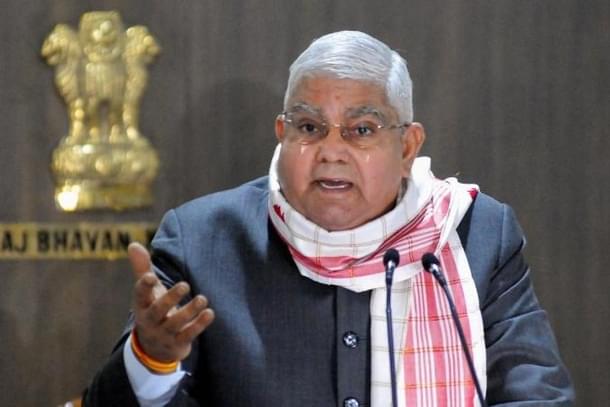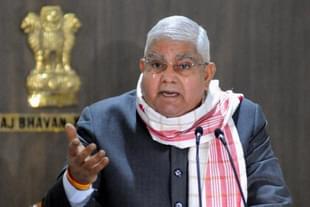News Brief
'Historic Mandate Of Parliament Undone': Vice President Dhankar Tears Into Judiciary Over NJAC
Swarajya Staff
Dec 07, 2022, 06:28 PM | Updated 06:34 PM IST
Save & read from anywhere!
Bookmark stories for easy access on any device or the Swarajya app.


Vice-President Jagdeep Dhankhar on Wednesday (7 December) came down heavily on the Supreme Court for striking down the National Judicial Appointments Commission (NJAC) Bill.
Dhankhar was addressing the parliament after assuming the position of the Chairman of the Rajya Sabha as the winter session commenced today.
The VP pointed that there was an "unprecedented support" for the Bill, the Lok Sabha unanimously voted in the Bill's favour and that the Rajya Sabha too voted unanimously with just one abstention.
"Rarely in parliamentary democracy, there has been such massive support to a constitutional legislation. This was culmination of a basic, fundamental parliamentary process", Dhankhar said highlighting the support for the Bill.
"This was undone by the Supreme Court by a majority of 4-1 on the basis that this bill was not in line with the judicially evolved doctrine of the "Basic Structure" of the Constitution", Dhankhar narrated further.
"There is no parallel to such a development in democratic history where a duly legitimised constitutional prescription has been judicially undone", the VP said while expressing concern.
He called this instance a "severe compromise of parliamentary sovereignty and disregard of the mandate of the people of which this house [Rajya Sabha] and the Lok Sabha are custodians."
Dhankar said that one should keep in mind that the 'basic' of any "Basic Structure" is the primacy of the mandate of the people reflected in the parliament, while taking a shot at the SC.
Emphasising the importance of parliament, he said that parliament is the "exclusive and ultimate determinative of the architecture of the Constitution."
It should be noted that the NJAC Bill was a landmark moment in Indian democratic history that represented a significant shift in the way the country's higher judiciary was to be appointed.
In place of a system where judges appointed other judges, it provided a say to other arms of the state in the selection process. However, it was struck by the SC based on the argument that it would undermine the independence of the judiciary.
Dhankhar had called it a "serious issue" earlier too. On Constitution Day, he said that he was "startled that after this verdict (NJAC), there was no whispering in Parliament. It was taken as such."
The doctrine of the "Basic Structure" of the Constitution holds that certain fundamental principles and features of the Constitution are so essential to the functioning of the country's democracy that they cannot be amended by the Parliament, even with a unanimous vote.
The striking down of the NJAC Bill has caused controversy and debate within India and beyond. Critics argue that the Supreme Court's use of the "Basic Structure" doctrine represents a blatant attempt to protect its own power and preserve the status quo, rather than serving the interests of the people.
On the other hand, supporters of the Court's decision argue that allowing the executive and legislative branches to have too much influence over the appointment of judges would compromise the impartiality and integrity of the judiciary, potentially leading to corruption and abuse of power.





